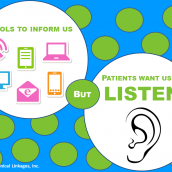Ebola is a nasty disease. But ignorance is worse. If you doubt this statement, take look at film clips from BBC World on the struggle to bring calm, through the use of the evidence, to the many frightened people in West Africa. Why, in America, where we have access to a 24/7 news cycle, has fear taken control of our brains? A recent Wall Street Journal article is a case in point. The article is about the nurse who volunteered to care for people with Ebola in Sierra Leone. It is a disheartening look at what misinformation does to people. It drives politicians to mandate rules so their … [Read more...]
Would You Remodel a Building Without a Blueprint?
Not likely. If you have been through a remodeling experience in your organization then you know it takes time, clear communication and above all a plan to enact the vision of the new facilities. Having been through this process, I recall the angst living amidst changes in the environment. In fact, there was more than one meeting where frustrations aired and the group had to be re-centered on the intended vision/outcome. Whew! Adopting EBP without a Blueprint? Evidence based practice needs a blueprint to work. It is one thing to say we need to translate the current evidence guideline on … [Read more...]
Listen! Say Our Patients
Patient engagement is the new mantra. Several posts on 21st Century Patients blog have addressed this phrase and the confusion surrounding the term. Likewise, there are can be no defined outcomes for “engagement”. Although a meaningless phrase it is here to stay – subject to various interpretations and possibly used as a weapon for someone’s benefit. I suggest we step back a moment and really look at our clinical care areas for the presence of “engagement”. What do you see? Where are the eyes and ears? Perhaps you can identify with the scene in the Emergency Department of this story in … [Read more...]
What The Friendly Skies Can Teach Us About Patient Safety
If you fly, you recognize these words… “Ladies and Gentlemen we would appreciate your attention as we explain the safety features of this aircraft.” The approach varies slightly by airline but basic information about air turbulence and the importance of wearing your seat belts, the location of emergency exits, and how to use oxygen masks is spelled out in simple language. For those of us who fly often this safety briefing seems humdrum, and can lead us to a complacent attitude about the role we might assume if there is an in-flight emergency. It could be a fatal mistake if we have not … [Read more...]
Passing the Baton – Hospital Handoffs
Just another initiative? Did you run track in high school or college? If so, there is a chance you were in a relay. Relays required skill not just in running but also in the method of transferring the next leg of the race to a teammate. You learned to pass the baton. If you dropped the baton the consequences were obvious and immediate. Handoffs have become another initiative in hospitals. Taking a cue from sports, hospitals and professional organizations are launching handoff strategies in various clinical areas. Just as an athlete transfers responsibility for the next leg of the race when … [Read more...]
Clinicians as Pathfinders….Lessons from the Past
Pathfinders are urgently needed! Flashback to 1914 and glimpse a slice of history that brings perspective to clinical leadership today. Let’s see what we can take away from a quick journey in time. Consider the Landscape One hundred years ago, it was early in the Great War, a time when everyone believed the war would be short-lived, and they would be returning to a world as they knew it. The brutal reality began to unfold daily, until more than five million people died. By the war’s end, 13 million people had been wounded. Despite the incomprehensible agony and chaos of WWI, there were … [Read more...]
3 Simple Measures to Reduce Medication Errors
In the last post I asked if “engaged patients” was a buzz-word or a reality given the differing ways people interpret the term engaged. If we believe that “engaging patients” means to actively listen to understand the patient’s needs, we are on a path to partnership with patients and families. Active listening opens the door to meaningful two-way communication. The added bonus of tuning-in for a couple of minutes is that patients sense a higher level of interest from the nurse and doctor. And this is your direct connection to managing HACAPS. HACAPS will never be a true measure of clinical … [Read more...]
Engaged Patients, A Buzzword or Reality?
You are busy clinicians practicing in a hospital today and this term “patient engagement” is driving a lot of discussion and initiatives to demonstrate your patients are “engaged”. In fact, you are indirectly measured on this in the HCAPS. I would like to challenge the use of the term because it has no standard definition in healthcare, which means it is being driven by individual perceptions. Let’s visualize how this could play out in a cartoon like, Calvin and Hobbs or The Far Side. Calvin tells his pal Hobbs, “The doctor said my gage ended but I didn’t have a gage did I?” or Gary Larson’s … [Read more...]
What Do Our Patients Know About Their Hospital Care?
If you are a nurse or doctor and practice in a hospital today you understand the feeling of being on a fast train that has gone out of control. You and your patients are living in a rapidly changing environment, and the end point for this very fast ride is an unknown. Yet, you practice to achieve best outcomes for your patients, perhaps with variable resource and staffing. But, if the numbers (those measurements of outcome, satisfaction and other factors) are not in the ballpark, everyone suffers because money is lost to the hospital in which you practice. In a recent post for Forbes … [Read more...]
Is It a Cereal: HCAPS?
Do you remember the “snap, crackle and pop” ads when you were a kid? If you just poured the milk on the cereal and put your ear close to the bowl you could hear the “snap, crackle and pop” described by little jumping elves. So you poured your milk and you LISTENED. HCAPS are intended to be about listening. HCAPS has an impressive full name; Hospital Consumers Assessment of Healthcare Providers and Systems, it is a survey designed by government agencies to seek feedback from patients about the care they receive in the hospital. The survey is voluntary and asks 27 questions ranging from … [Read more...]






